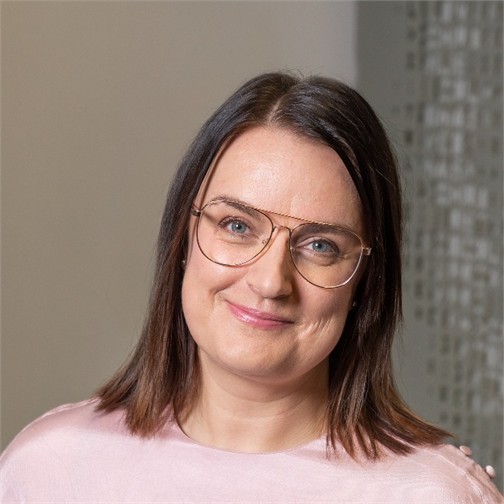
Accessibility and individual arrangements
At HAMK, we offer a variety of support measures to support your studies. For example, different learning difficulties entitle the student to the necessary individual arrangements.
You have the possibility to ask for individual arrangements for your studies if you want your personal health problems and/or learning difficulties, for example, to be taken into account in the educational arrangements.
Such individualised arrangements may include, for example, extra time for exams/assignments, a separate exam room or flexible performance opportunities. Applications are processed by the Student Welfare Services unit.
For all matters relating to equality of study, the person in charge at HAMK is the special needs teacher and you should contact him or her when applying for individual arrangements.
Contact us

Practices for individual arrangements
Practices for individual arrangements until 31.8.2021
Applying for individual arrangements and distributing the decision to teachers
- Have a discussion with your special education teacher and show him or her the relevant certificates
- Fill in the application for individual arrangements
- Once you have completed the application, you will receive an automatic confirmation that the application has been sent to your email address.
- The special teacher or educational psychologist will make a decision on the application within about two weeks of the application being submitted.
- You will receive the details of the decision by email to the address you provided on the application form. Please use the HAMK email address on the form.
- The details of the decision are recorded in the Pakki as a contract and as a student you are responsible for informing your teachers of the individual arrangements granted to you.
- Share the agreement recorded in the Pakki with the teachers you want to take into account in your teaching. Check the instructions how to do this in Pakki.
- If the decision on the individual arrangements has not yet been entered in Pakki, but you have an exam coming up, for example, you can send the teacher an email about the arrangements granted. However, remember to share the decision with your teachers as soon as it appears in Pakki.
Accessibility of studying and teaching at HAMK
Accessibility refers to the ways in which the physical, mental and social environment is designed to ensure that everyone can interact with others on an equal basis, regardless of their individual characteristics.
Accessibility is important to all HAMK students and staff. It is particularly important for people who have some form of mobility or functional disability, or who are elderly or belong to a cultural or linguistic minority.
Efforts to improve accessibility support the removal of various barriers to learning. In addition to the accessibility of facilities, attention will be paid to the removal of so-called invisible barriers. Such barriers include specific learning challenges and barriers related to mental health problems.
Detailed instructions on the individual arrangements for the national entrance examination are available on the uasinfo.fi website. By the deadline, you must submit your application for individual arrangements, together with the attachments, to the university of applied sciences where you intend to take the selection test.
Applicants can also request individual arrangements for HAMK’s own selection tests, which follow the same principles as the national selection test. Instructions for applicants can be found on the HAMK website.
Individual arrangements for the selection test may be taken into account on the basis of a medical certificate or expert opinion. Arrangements are agreed on a case-by-case basis. Arrangements may include extra time, an assistant, a technical aid, a quiet test room, a separate screen, a wireless electronic health monitoring device, a guide or assistance dog or other special arrangements.
HAMK’s special accessibility arrangements will also be available on campus maps in the future.
An accessible and safe environment enhances the well-being of students, staff and visitors, and the functioning of the university as a whole.
A barrier-free environment makes it easy to move around and participate. Accessibility means easy access to buildings, stair-free movement from one place to another, clear signage and a good listening environment, and equal opportunities to study, work and leisure.
The accessibility plan for facilities management and services focuses on the physical accessibility of the learning and operating environments of HAMK and HAMI and digital information on the accessibility of the Group.
The accessibility plan for HAMK’s facilities management and services covers the following areas: buildings (barrier-free access to buildings and movement and operation in buildings, barrier-free toilets), barrier-free outdoor areas and walkways, park areas, disabled parking, barrier-free routes, signage and maps.
Descriptions of HAMK’s accessible mobility environments will be available on campus maps in the future:
- Accessible parking and shuttle areas on campuses.
- Main entrances, doors with automatic door openers and barrier-free routes to HAMK premises.
- HAMK reserves a wheelchair for visitors, which can be borrowed from the receptionists on request. (HANKINTA, informaatio)
- Lecture halls, other facilities and service points equipped with induction loops and accessible by wheelchair
- Accessible campus restaurants
- Accessible sports and fitness halls and changing rooms
- Accessible facilities for the Students’ Union
- Accessible toilets
- Lifts to move between floors.
Schedule:
- 2022 autumn, mapping
- Spring 2023, the current state of accessibility will be published.
- 2023 Autumn, accessibility improvement work will start by addressing the most significant deficiencies
- 2024-> Systematic improvement of accessibility to reach the target level by prioritising investment and operational projects
In the above-mentioned areas, HAMK strives to provide equal opportunities for studying and working and operating environments for all HAMK and HAMI students and staff.
Efforts will be made to remedy existing shortcomings as a matter of urgency, especially in buildings where a high level of accessibility is sought. For these buildings, an accessibility mapping has been carried out and the accessible areas of the building have been described.
In new construction, major renovations and larger office conversion projects, the level of accessibility to be achieved is already taken into account at the design stage. If the renovation or change of use is extensive, it is appropriate to improve the accessibility of the whole building. The more limited the number of people using the building, the more economic considerations are relevant. It may or may not be appropriate to improve some aspects of the accessibility of a building, taking into account the characteristics of the building and the nature and extent of the intervention.
Monitoring and evaluation
For monitoring and evaluation purposes, an annual review will be carried out in each region to ensure compliance with these criteria and/or to coordinate the necessary corrective actions to achieve compliance.
An overview of the guidelines, training, tools and methods used in HAMK’s construction can be found in the Ministry of the Environment’s guidelines on building accessibility.
Responsibilities
The director of facilities management and services or a representative will ensure that staff responsible for procurement, programs and services have adequate technical knowledge of accessibility standards.
The Director of Property Management is a member of the HAMK Accessibility Steering Group to coordinate physical accessibility initiatives for real estate services with broader anti-discrimination efforts.
The Accessibility Resources Officer is involved in ensuring that accessibility considerations and issues are addressed in university-wide building projects and initiatives.


Legislation
HAMK Ltd and HAMI are committed to complying with the legislation:
- Universities of Applied Sciences Act, (26 §), (28 §), (31 §) ja (33 §)
- The Constitution of Finland
- YK:n yleissopimus vammaisten henkilöiden oikeuksista (27/2016)
- Maankäyttö- ja rakennuslaki (132/1999) 117 e § (21.12.2012/958)
- Valtioneuvoston asetus rakennuksen esteettömyydestä (241/2017)
- Ympäristöministeriön ohje rakennuksen esteettömyydestä.
To support the accessibility of studies, HAMK offers students
- an accessible learning environment (learn.hamk.fi), using the text reader ReadSpeaker
- an easy-to-use working environment (MS365)
- training on easy-to-use digital tools in the Digistartti package
- the possibility to order textbooks read aloud from the Celia service
- assistive technologies
- library support
In addition, HAMK staff will be trained to design teaching according to the Universal Design principle, which is applicable to all, and to produce accessible content and materials for learning environments.
Support and guidance for progress in your studies
Enabling students to progress in their studies is part of accessibility. At HAMK, students have access to support and guidance throughout their studies. Depending on the situation and the student’s needs, support and guidance is provided by the staff of the training courses and the staff of the HAMK support and expert services. In addition to HAMK staff, students are supported and guided by several HAMK partners, such as the student union HAMKO, the Student Health Foundation YTHS and social experts in the HAMK area of operation..
Accessibility and equality are core principles in the planning, organisation and implementation of the guidance services offered at HAMK. Support and guidance services are equally accessible to all students. Students have access to individual support in the form of, for example, study guidance and various welfare services. Where appropriate, support and guidance is provided through multidisciplinary cooperation.
Support and guidance on progressing and completing your studies is provided by the course tutors, course teachers, module tutors, placement tutors, thesis tutors, any tutors/group tutors and the special teacher. Student welfare services are provided by a psychologist, a curator, a special needs teacher and a sports counsellor.
At HAMK, students can progress in their studies according to the study modes (8-16, 18-100 and 24/7). Support and guidance are also provided to ensure that students can complete their studies by moving between different study modes or by combining different study modes.
HAMKissa käytettävät tietojärjestelmät ja digitaaliset palvelut tukevat esteetöntä opiskelua. Opiskelijoille on tarjolla opiskelussa käytettäviin digitaalisiin työkaluihin liittyvää perehdytystä, neuvontaa ja ohjeita. Opintoihin liittyvää tukea on saatavilla digitaalisesti. Digitaaliset tuki- ja ohjauspalvelut ovat ajasta ja paikasta riippumattomia sekä yhdenvertaisesti saavutettavia. Digitaaliset ohjauspalvelujen järjestämisessä noudatetaan valtakunnallisia digiohjauksen laatukriteereitä. The information systems and digital services used at HAMK support accessible learning. Students are provided with orientation, advice and guidance on the digital tools used in their studies. Study-related support is available digitally. Digital support and guidance services are available at any time and place and are equally accessible. Digital guidance services are provided in accordance with the national quality criteria for digital guidance.
University sport
HAMK’s sports services are provided by a sports planner and are known as Hamk Moves. The activities and services aimed at maintaining and developing physical activity at the university are accessible to all students. The task of the sports planner is to support students individually in matters of physical activity and mobility, where necessary, and there are various support measures and possibilities for individual arrangements. HAMK actively supports the combination of goal-oriented sport and studies and has signed a cooperation agreement with the Hämeenlinna Sports Academy to promote this. The athlete’s life situation is taken into account when planning studies, and the entire study path is planned to reconcile sport and studies and ensure continuity of studies. In addition, students are supported in the development of their physical capacity through cooperation between HAMK’s sports services and YTHS in the form of a functioning service chain.
Students can request individual arrangements for their studies. These arrangements may take into account personal health problems, hearing, visual or other sensory impairment, dyslexia, panic disorder, ADHD or learning difficulties. Such individualised arrangements may include extra time for assignments or exams, a separate exam room or other flexible performance options on a case-by-case basis.
Individualised arrangements are not a reason to compromise on the competence objectives, but are intended to support the achievement of the objectives. For example, each student is assessed on the same criteria and any individual arrangements do not affect the assessment. Exemptions from the compulsory parts of the qualification cannot be granted except for extremely serious reasons (e.g. the participation of a deaf person in a listening comprehension test). The preferred method is to agree an alternative delivery method with the teacher responsible for the course. Individual arrangements must be based on a proven need, for example, an illness, disability or learning difficulty diagnosed by a doctor or specialist.
Individual arrangements are applied for using an online form. Before completing the application for individual arrangements, the student makes an appointment with the special education teacher and, during the discussion, presents the supporting documents (e.g. reading certificate, doctor’s statement) related to the request for individual arrangements and, after the discussion, he/she can complete the online application.
A student preparing for an exchange may need accessibility services because of a disability, illness or learning difficulty, for example. The purpose of individual arrangements is to support students’ studies and daily life during their exchange: accommodation, mobility, participation in activities, well-being and general well-being. The need for support and the appropriate solutions for each situation will vary from one student to another. It is a good idea to start looking for information and organising support as early as possible. It is up to the student preparing for the exchange to express his/her needs in terms of accessibility and related arrangements.
ESOK (the European Network for Accessible Studies in Higher Education) and CIMO (the International Organisation for Mobility and Cooperation) have put together a checklist for staff working in higher education international affairs offices, dealing with accessibility and disability issues and helping students who need accessibility support.
Special needs are not a barrier to internationalisation. In addition to the exchange grant, students or staff members may receive additional financial support to participate in an international exchange. Accessibility support is available under several schemes run by the Finnish National Board of Education. For the period 2021-2027 of the Erasmus+ programme, similar support is available under the name of Inclusion Support. Accessibility or inclusion grants are intended to enable exchanges where a special need causes extra costs for the exchange period that cannot be covered by other sources. The special need may be due to a disability, mental or physical illness, learning disability, personal situation or other similar reason. The application process is completely confidential. For example, support may be granted for special arrangements for accessible housing, mobility or study, such as learning materials or the cost of assistants and preparatory visits.
Current situation
HAMK International is responsible for ensuring accessibility when meeting students in exchange guidance discussions when planning an exchange. During the discussion, students bring up any barriers they may have, in which case, according to OPH guidelines, students may be able to receive additional financial support for their exchange according to their needs. In addition, HAMK International will check with the partner school about their circumstances in relation to special needs, for example, whether the campus area is accessible, whether the accommodation available to students is accessible and whether there is anything specific about the location that should be taken into account if the student has any special needs.
The challenges
A particular challenge for incoming exchange students is the housing situation, how can we be sure that we provide accessible student accommodation? In the student guidance situation, any special needs of a student may not be highlighted unless the student specifically mentions them. The challenge is when the student’s special need is not made clear during the meeting, so that the guidance process misses the support for the special need and the important role of communication with the partner school about the student’s needs, for example in relation to the accessible campus area and housing.
Student admissions involve various application and selection processes, the end result of which is that some applicants are admitted to HAMK. Student selection is based on pre-defined selection criteria which ensure equal treatment of applicants. Students are admitted to degree courses, teacher training courses, specialization courses, diploma and specialist courses, open university studies and further training courses.
Current state of accessibility of student selection
The HAMK website contains information about all the courses you can apply for or enrol in. For example, in the areas of degree courses and teacher training, basic information about the courses, study content, study practices, field of study, working life and application instructions are provided. In the texts addressed to applicants, efforts have been made to follow accessibility guidelines, both in terms of text formatting and content.
In addition, the Opintopolku portal maintained by the Finnish National Board of Education will be updated with descriptive texts for degree-level education and teacher training, student selection criteria, instructions for the application process and information on selection tests. Applicants submit their applications and the whole selection process is managed in the Opintopolku system. The Opintopolku portal also contains information on other courses and there are currently plans to bring the Open University of Applied Sciences courses to the portal. Information on applying for degree courses and the national UAS entrance exam is also available on the uasinfo.fi website, which is maintained by the Development Project for Student Admissions to Universities of Applied Sciences (Metropolia AMK).
The objectives for improving accessibility of student choices
Accessibility will be improved in the context of HAMK’s website redesign. The structure and language of texts and instructions will be clarified. Attention will also be paid to other communication with applicants and ways will be sought to make the instructions understandable to all.
Responsibilities
The Education Development Manager is a member of the Accessibility Steering Group. Accessibility experts have been appointed in the Educational Support Services to coordinate accessibility work and to work in the university’s network of accessibility experts.
Each member of staff is responsible for the accessibility of activities, documents and other content related to their own work. Staff members must have the capacity to produce accessible documents related to their work.
New people are trained in accessibility issues relevant to their own work.
Contact us


Accessibility and individual arrangements



Further information
The effort to promote accessibility and accessibility is based on the following agreements and laws:
- Convention on the Rights of Persons with Disabilities (27/2016)
- The Constitution of Finland (1999/731)
- Non-discrimination Act (1325/2014)
- Act on Equality between Women and Men (609/1986)
- Universities of Applied Sciences Act (932/2014), (26 §), (28 §), (31 §) ja (33 §)
- Accessibility Directive (2019/882) and preferences (xxx/2022, xxx/2022, xxx/2022), only in Finnish
- European Web Accessibility Directive (Directive EU 2016/2102 of the European Parliament and of the Council on accessibility of online services and mobile apps for public sector organisations)
- Act on the Provision of Digital Services (306/2019).